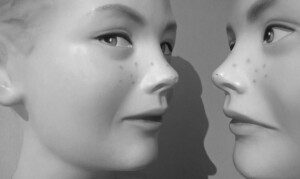There are 10 distinct reasons why some autistic people avoid eye contact as much as possible or, if they do hold it, they still find it troublesome.
Let’s not forget the second word in the name of the neurotype: Autism Spectrum Disorder.
When it comes to eye contact, there’s a continuum, with some autistic people at one end (complete avoidance) and others at the opposite end (staring too much) – and all the other Autists in between.
I’ve met autistic people in person who’ve told me that eye contact comes naturally to them and doesn’t cause any problems.
I’ve also seen this expressed in threads on two popular autism community sites.
I’ve met others who fake it (looking at noses or mouths), and I’ve also read posts by autistic people for whom eye contact for just a few seconds is unbearable.
Having taken a deep dive on the topic of eye contact (yes, it’s a special interest), I’ve extracted 10 distinct reasons why holding gaze causes issues for some people on the Autism Spectrum.
The 10 reasons listed below are in no particular order.
#1 Sensory Overload

Gerd Altmann/Pixabay
There’s three ways this can occur: 1) While the Autist is listening, 2) While the Autist is talking, and 3) Both while listening and talking.
The individual may insert eye contact during moments of silence so as not to appear completely disconnected, but this insertion may also feel natural.
Maintaining eye contact while listening or talking is a distraction. There’s too much going on.
One post I read described it like trying to read a book while talking to someone.
I can easily stare into the eyes of someone speaking to me.
But I prefer to keep my eyes off their face when I’m the speaker. They naturally drift to the side as I talk.
It’s too distracting to hold eye contact and explain something at the same time.
I’ve tried this, actually, and it required conscious thought to maintain the eye contact, and it slowed down my speech.
My eye contact with the listener probably came off as unnatural and too fixed (it certainly felt that way).
In short, for some Autistics, sustaining eye contact takes too much cognitive energy, and as a result, focus on the conversation gets compromised.
#2 It’s Too Personal or Intimate

Freepik.com
“For me it doesn’t feel like a distraction, but an intimate connection — possibly too much of a connection, depending on the person or circumstance,” says Jess Owen, co-creator of thewyrdsisters.co.uk with her sisters and diagnosed with ASD at 25.
“I almost always make eye contact with my partner, do it now and again with friends and family, and practically never with strangers.”
For some, it feels too personal with anyone other than immediate family members, relatives they feel close to and long-standing close friends.
For others, it feels too personal only temporarily. For instance, after chatting with a new neighbor or someone in the gym locker room for 10 minutes, they’ll find eye contact no longer feels too personal or “too much.”
Others can easily hold gaze with coworkers and other people they regularly interact with.
But they may find it very awkward and uncomfortable with transient interactions with strangers – such as a cashier or clerk, a UPS delivery person, someone holding a door open for them, and other people representing very brief, “once-only” encounters.
For these transient encounters, direct eye contact represents more connection than what the circumstance calls for — and the Autistic doesn’t want that level of connection.
#3 It’s Intrusive, Even Invasive
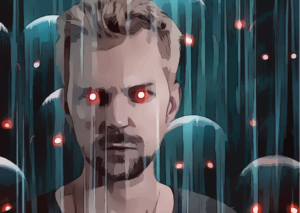
Square Frog/Pixabay
This descriptor seems to be an exacerbated form of the preceding issue.
If it’s only “too personal,” but the Autist holds it anyways due to perceived high stakes (e.g., a job interview, meeting their partner’s parents for the first time), the discomfort level isn’t significant; it’s more of a persistent glitch.
But when an Autistic says it’s “intrusive” or “invasive,” this causes discomfort ranging from very bothersome to outright unbearable.
Posters in threads have described this as feeling as though their most private thoughts are being revealed or that their soul is being dissected.
This is not paranoia. It may be activation of the brain’s amygdala.
The eyeball-on-eyeball experience evokes a fight or flight feeling, even if the other individual isn’t a person in authority.
The sensation is that of someone crashing into one’s personal space, or of the Autist themselves suddenly being naked and fully exposed.
The perception of invasiveness may fade as the Autist gets to know someone better, such as a sibling’s new spouse.
#4 Can’t Get It Right

Shutterstock
Some Autistics have given up on eye contact and just avoid it for the most part because it’s too much of a nuisance to “do it right.”
The issue isn’t that it feels too personal or invasive, but that it doesn’t feel like it’s being done correctly.
The Autist may sense that they’re staring too much. While in conversation they get sidetracked over whether or not it’s time to break eye contact.
They may get distracted by some “rule” they read, such as, “Break eye contact every five to seven seconds.”
They overthink it; it’s mechanical. For some Autists (such as myself), they simply let the mechanical feeling slide and just keep looking (in my case, as the listener).
But for others, they just can’t help but get caught up with doing it correctly (whatever that is, right?).
This ends up feeling like a heavy burden. The solution for some is to just avoid it except only when very necessary.
I’ve read posts by Autistics who said their staring (in an attempt to follow Western society’s rules for eye contact) creeped people out or made others think they were being aggressive or flirtatious. Solution? Again, just avoid it.
#5 Auditory Processing Disorder

Shutterstock/New Africa
Some on the Spectrum watch a person’s mouth while listening to make sure they catch all the words.
With APD, it’s difficult to detect subtle variations in the sounds of words.
These Autists have learned to use lip movements as an adjunct to what they’re hearing.
#6 It Doesn’t Feel Natural
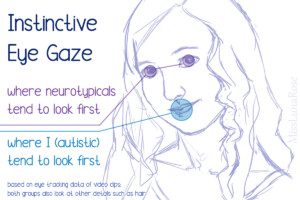
MissLunaRose12/creativecommons.org
In these cases, there’s no over-staring, feelings of intrusiveness or physical pain, or difficulty following the conversation.
Instead, the Autistic simply forgets to make or hold eye contact.
It feels more natural for them to look all over the place while in conversation, or at least, rove their eyes about the other individual’s face instead of locking onto their eyes.
Once they remember to do so, it’s no problem. But because the other person’s eyes are not where the Autist’s naturally want to land, they soon start looking away again.
A good analogy is if you moved to a culture where it’s a big societal norm to hold “waist contact.”
Whether speaking or listening, you had to keep looking at a person’s waist.
This would not feel natural, and it wouldn’t be long before you found your eyes meeting theirs (or their nose or mouth).
You had to keep reminding yourself, “Look at the waist.”
#7 To Be Less Noticed
Freepik.com/rawpixel.com
“Since I’ve begun working from home, I make a lot of video calls, and it provides an interesting opportunity to make eye contact without really making eye contact,” says Jess.
“Turns out I love studying people’s faces, the changes in their expression, when I don’t feel like they’re directly staring at me (especially if I have my camera off).
“So perhaps there’s some sort of desire for anonymity in it; perhaps making eye contact makes me feel too exposed, too noticed.”
If this doesn’t quite make sense to a neurotypical, think of it this way: Some people actually believe picking their nose in public will be less noticed if they keep their eyes down. Lowering their eyes makes them feel kind of invisible.
This is the same concept when someone (NT or not) feels embarrassed. What do they do?
They drop their eyes. It truly does make one feel less noticed. However, we all know that this is just an illusion!
#8 Absorption of the Other Person’s Energy

Freepik.com/bedneyimages
I’ve read a small number of posts in which the aversion to eye contact relates to feeling another person’s energy.
Whether what the Autist is feeling is actually the other’s energy, or if it’s only a subjective perception of such, the experience feels real enough to make eye contact unwelcome.
Another way of putting this is that the Autistic gets an inundation of the other person’s emotions when eye contact is made.
“When I look directly into someone’s eyes, I seem to really internalize their feelings,” says Lena Salgado, 44, co-owner of Martial Science Academy karate school.
“If I’m relatively calm and not very stressed out, it’s easy for me,” continues Lena, who was diagnosed with autism at 37.
“If I’m relaxed or talking about an easy topic that I love and don’t have to think too much, I can do it.
“If I’m calm and someone else is upset or angry, it’s not a problem. There was a car accident near the studio last week and I was the first one there to help.
“The young guy in one of the cars was so upset and hurt and scared, but because I was totally calm I could look him in the eye and get him to relax and talk to me.
“If I’m really cranky or angry, even with neutral people, I avoid eye contact because it feels like any emotion, positive or negative, from them just piles on top of mine and I’ll be crushed under the weight of it all.
“The good part is that I tend to emotionally regulate really well, so I’m pretty good most of the time.”
I interviewed an autistic woman who says eye contact is troubling because it makes her feel as though the other person’s energy “shoots through” her.
#9 It Causes Physical Pain
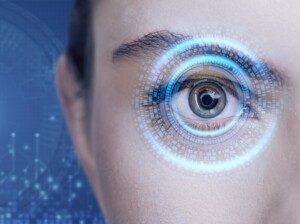
Freepik.com
I’ve read posts in the autism forum threads that eye contact literally causes pain.
Usually, the pain is described as that of looking into a bright light or even the sun, though the pain can also have other descriptors such as pressure.
Here’s my interview with a man for whom holding direct gaze causes his eyes to uncomfortably water.
The sensation of physical discomfort may be due to over-activation of the amygdala.
#10 The Autistic Themselves Feels Like the Intruder

Loana Cristiana/Unsplash
Okay, this one describes me at times, but I’ve also heard this from two other Autistics.
The other person’s eye contact isn’t the issue. The Autist feels like they themselves are overstepping some kind of boundary.
This doesn’t happen to me all the time, but when it does, it’s never with a family member.
It may happen with cashiers, gym employees, someone starting small talk in the locker room, a serviceperson at my house and other “thin” interactions.
I feel as though I shouldn’t be holding eye contact, if that makes any sense.
It’s almost as though I’m stepping into their personal space and that they might think I’m overdoing it.
This reason sounds similar to #4, “Can’t Get It Right,” but it actually deserves its own category.
Here’s my interview with a woman who says she herself feels like the invader.
 Jess Owen, along with her sisters Emily and Abi, run thewyrdsisters.co.uk, about autistic sisters navigating a neurotypical world. Their goal is to spread information and awareness, and open up a conversation about neurodiversity that will make life easier for everyone.
Jess Owen, along with her sisters Emily and Abi, run thewyrdsisters.co.uk, about autistic sisters navigating a neurotypical world. Their goal is to spread information and awareness, and open up a conversation about neurodiversity that will make life easier for everyone.
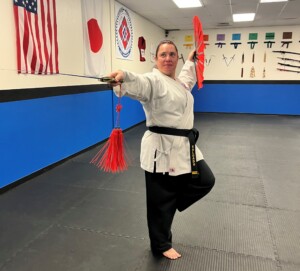 Renshi Lena Salgado and Renshi Tom Beach own Martial Science Academy in Aurora, CO, with the goal of teaching students of all ages, abilities and goals the physical, emotional and mental benefits of Shito-Ryu Karate. At MSA, they strive to create a safe and nonjudgmental environment. They love teaching and use different approaches depending on each student’s learning style to make Karate accessible to all. Follow on Facebook.
Renshi Lena Salgado and Renshi Tom Beach own Martial Science Academy in Aurora, CO, with the goal of teaching students of all ages, abilities and goals the physical, emotional and mental benefits of Shito-Ryu Karate. At MSA, they strive to create a safe and nonjudgmental environment. They love teaching and use different approaches depending on each student’s learning style to make Karate accessible to all. Follow on Facebook.
 Lorra Garrick has been covering medical and fitness topics for many years, having written thousands of articles for print magazines and websites, including as a ghostwriter. She’s also a former ACE-certified personal trainer. In 2022 she received a diagnosis of Level 1 Autism Spectrum Disorder.
Lorra Garrick has been covering medical and fitness topics for many years, having written thousands of articles for print magazines and websites, including as a ghostwriter. She’s also a former ACE-certified personal trainer. In 2022 she received a diagnosis of Level 1 Autism Spectrum Disorder.
.

